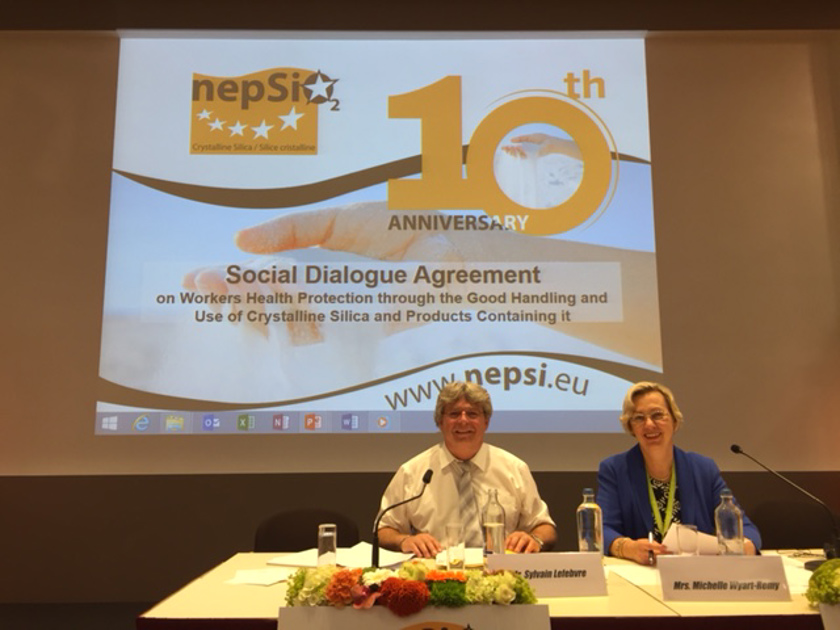a crucial step to enhance worker protection across the European Union
Among these achievements, it has been demonstrated over the last ten years that the NEPSI Agreement is a unique tool to improve workers' protection on the work floor thanks to the respirable crystalline silica dust reduction measures described in the evolving Good Practice Guide.
Together, the above mentioned 15 signatory industry sectors and IndustriAll form 'NEPSI', the European Network on Silica, which has facilitated the implementation of good practices in dust reduction measures and also monitored the application of the Agreement through five bi-annual reports of key performance indicators.
On 13 May 2016, EU Commissioner Marianne Thyssen presented a proposal to revise the Carcinogens and Mutagens Directive at work (CMD)[1]. On this occasion, the Commission proposed to include in Annex I "work involving exposure to respirable crystalline silica dust generated by a work process" and to establish in Annex III a Binding Limit Value for respirable crystalline silica dust ('respirable fraction') at 0.1 mg/m³.
The NEPSI Signatories acknowledge the Commission's proposal for this Binding Limit Value which aims to protect workers while defining a clear 'level playing field' across the EU.
NEPSI signatories saw with satisfaction Recital 6 of the proposed amendment of the Carcinogens and Mutagens Directive which acknowledge NEPSI Good Practices' role as a valuable instrument to complement regulatory requirements and to support their effective implementation.
Commissioner Thyssen marked this milestone for the NEPSI Agreement with a video message at the Conference:
[…] "The NEPSI Agreement has been a true testament of 'EU-level social dialogue in action'. […] The signature of this Agreement was a crucial step to enhance worker protection across the European Union. […] it has and still is complementing European legislation in the field of worker protection.
It is our common endeavor to create a culture of compliance with clear and enforceable rules. […]
Setting limit values through EU legislation is instrumental for protection of workers' health. But it is the quality of implementation and enforcement on the ground - on each factory floor, in each mine, on each construction site - that will determine whether lives are saved. That is where we see the true value of the bottom-up approach, which has driven the success of NEPSI".
NEPSI signatories confirm hereby their desire to continue working together for enhanced workers' health protection and to make sure that the NEPSI Agreement has a useful role to play in facilitating compliance with the proposed regulatory measures. The NEPSI Agreement is always open for new signatories.
16 June 2016
BIBM – The International Bureau for Precast Concrete
CAEF – European Foundry Association
CEEMET - European employers' organisation of the metal, engineering and technology-based industries
CEMBUREAU – The European Cement Association
Cerame-Unie - The European Ceramic Industry Association
EMO – European Mortar Organization
EURIMA - -The European Insulation Manufacturers Association
EUROMINES – The European Association of Mining Industries
EUROROC - European Federation of Natural Stone Industries
EXCA – The European Expanded Clay Association
FEVE – The European Container Glass Federation
GlassFibreEurope – The European Glass Fibre Producers Association
GLASS FOR EUROPE – The trade association for Europe's manufacturers of building, automotive and transport glass
IMA-Europe – The European Industrial Minerals Association
UEPG – European Aggregates Association
industriAll – European Trade Union
